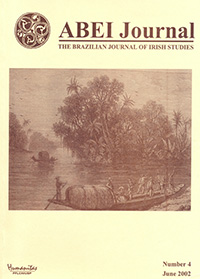Teenagers’ “Gender Trouble” and Trickster Aesthetics in Gina Moxley’s Danti Dan
DOI:
https://doi.org/10.11606/issn.2595-8127.v4i1p67-82Keywords:
Danti Dan, Gina Moxley, SexualityAbstract
Recently a type of drama has emerged in Ireland with characters representing isolated social groups that were overlooked or considered as marginal. It includes plays with teenagers as protagonists, conceived by writers who seem to be inspired by the realization that the treatment of, and possibilities for children and youth are indicators of a society’s moral health. Christina Reid’s Joyriders (1986), Brownbread (1986) by Roddy Doyle, and Enda Walsh’s Disco
Pigs (1996) are a few notable examples. Danti Dan, Gina Moxley’s 1995 play is set in rural Ireland during the summer of 1970, with the parents not yet conscious of the fact that their children respond to a rapidly changing world and its sexual challenges in ways very different from the traditional patterns.
The present paper applies the trickster aesthetics as its main theoretical position, to create a discursive space for the investigation of a set of issues surrounding and underpinning the central concern of the play, the “gender trouble” of teenagers in the particular Irish context which has a still largely patriarchal structure. As a parallel, the analysis relies on the trickster signification in Toni Morrison’s novel Sula (1973), deploys the feminist psychology of Nancy Chodorow, and draws from Teresa Lauretis’s discussion of gender representation in “Technologies of Gender.”
References
Chodorow, Nancy. Feminism and Psychoanalytic Theory. New Haven: Yale UP, 1989.
De Lauretis, Teresa. Technologies of Gender: Essays on Theory, Film, and Fiction. Bloomington and Indianapolis: Indiana UP, 1987.
Dolan, Jill. “Gender Impersonation Onstage: Destroying or Maintaining the Mirror of Gender Roles?” Gender in Performance: The Presentation of Difference in the Performing Arts. Ed. Laurence Senelick. Hanover, NH: The UP of New England. 3-13.
Fairleigh, John. “Introduction.” Rough Magic: First Plays. Ed. Siobhán Bourke. Dublin: New Island, 1999. x-xii.
Furst, Lilian R. “Introduction.” Disorderly Eaters: Texts in Self-Empowerment. Ed. Lilian R. Furst, Peter W. Graham. University Park, Pennsylvania: The Pennsylvania State UP, 1992. 1-10.
Greene, Sheila M. “Growing up Irish: Development in Context.” The Irish Psyche. Special issue of The Irish Journal of Psychology. 15. 2, 3 (1994): 354-71.
Harrison, Alan. The Irish Trickster. Sheffield: Sheffield Academic, 1989.
Kristeva, Julia. Powers of Horror: An Essay on Abjection. Trans. Leon S. Roudiez. New York: Columbia UP, 1982.
Morris, Pam. “Introduction.” The Bakhtin Reader: Selected Writings of Bakhtin, Medvedev, Voloshinov. Ed. Pam Morris. London: Arnold, 1994.
Morrison, Toni. Sula. London: Picador, 1993.
Moxley, Gina. Danti Dan. The Dazzling Dark Ed. Frank McGuinness. London: Faber, 1996.1-71.
Murray, Christopher. Twentieth-Century Irish Drama: Mirror up to Nation. Manchester: Manchester UP, 1997.
O’Toole, Fintan. “Irish Theatre: The State of the Art.” Theatre Stuff. Ed. Eamonn Jordan. Dublin: Carysfort, 2000. 47-58.
Scolnicov, Hanna. Woman’s Theatrical Space. Cambridge: Cambridge UP, 1994.
Smith, Jeanne Rosier. Writing Tricksters: Mythic Gambols in American Ethnic Literature. Berkeley: The U of California P, 1997.
Thomson, Rachel, Janet Holland. “Sexual Relationships, Negotiation and Decision Making.” Youth Identities: Teens and Twens in British Culture. Heidelberg: Universitatsverlag C. Winter, 2000. 25-40.
Wright, Sarah. The Trickster-function in The Theatre of Garcia Lorca. London: Tamesis, 2000.
Downloads
Published
Issue
Section
License
Copyright (c) 2002 Mária Kurdi

This work is licensed under a Creative Commons Attribution-NonCommercial 4.0 International License.


